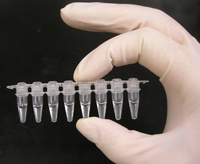
Photo from wikipedia
BackgroundDetermining the role of DNA methylation in various biological processes is dependent on the accurate representation of often highly complex patterns. Accurate representation is dependent on unbiased PCR amplification post bisulfite… Click to show full abstract
BackgroundDetermining the role of DNA methylation in various biological processes is dependent on the accurate representation of often highly complex patterns. Accurate representation is dependent on unbiased PCR amplification post bisulfite modification, regardless of methylation status of any given epiallele. This is highly dependent on primer design. Particular difficulties are raised by the analysis of CpG-rich regions, which are the usual regions of interest. Here, it is often difficult or impossible to avoid placing primers in CpG-free regions, particularly if one wants to target a specific part of a CpG-rich region. This can cause biased amplification of methylated sequences if the C is placed at those positions or to unmethylated sequences if a T is placed at those positions.MethodsWe examined the effect of various base substitutions at the cytosine position of primer CpGs on the representational amplification of templates and also examined the role of the annealing temperature during PCR. These were evaluated using methylation-sensitive high-resolution melting and Pyrosequencing.ResultsFor a mixture of fully methylated and unmethylated templates, amplification using the C-, C/T (Y-) and inosine-containing primers was biased towards amplification of methylated DNA. The bias towards methylated sequences increased with annealing temperature. Amplification using primers with an A/C/G/T (N) degeneracy at the cytosine positions was not biased at the lowest temperature used but became increasingly biased towards methylated DNA with increased annealing temperature. Using primers matching neither C nor T was in the main unbiased but at the cost of poor PCR amplification efficiency. Primers with abasic sites were also unbiased but could only amplify DNA for one out of the two assays tested. However, with heterogeneous methylation, it appeared that both the primer type and stringency used have a minimal influence on PCR bias.ConclusionsThis is the first comprehensive analysis of base substitutions at CpG sites in primers and their effect on PCR bias for the analysis of DNA methylation. Our findings are relevant to the appropriate design of a wide range of assays, including amplicon-based next-generation sequencing approaches that need to measure DNA methylation.
Journal Title: Clinical Epigenetics
Year Published: 2017
Link to full text (if available)
Share on Social Media: Sign Up to like & get
recommendations!